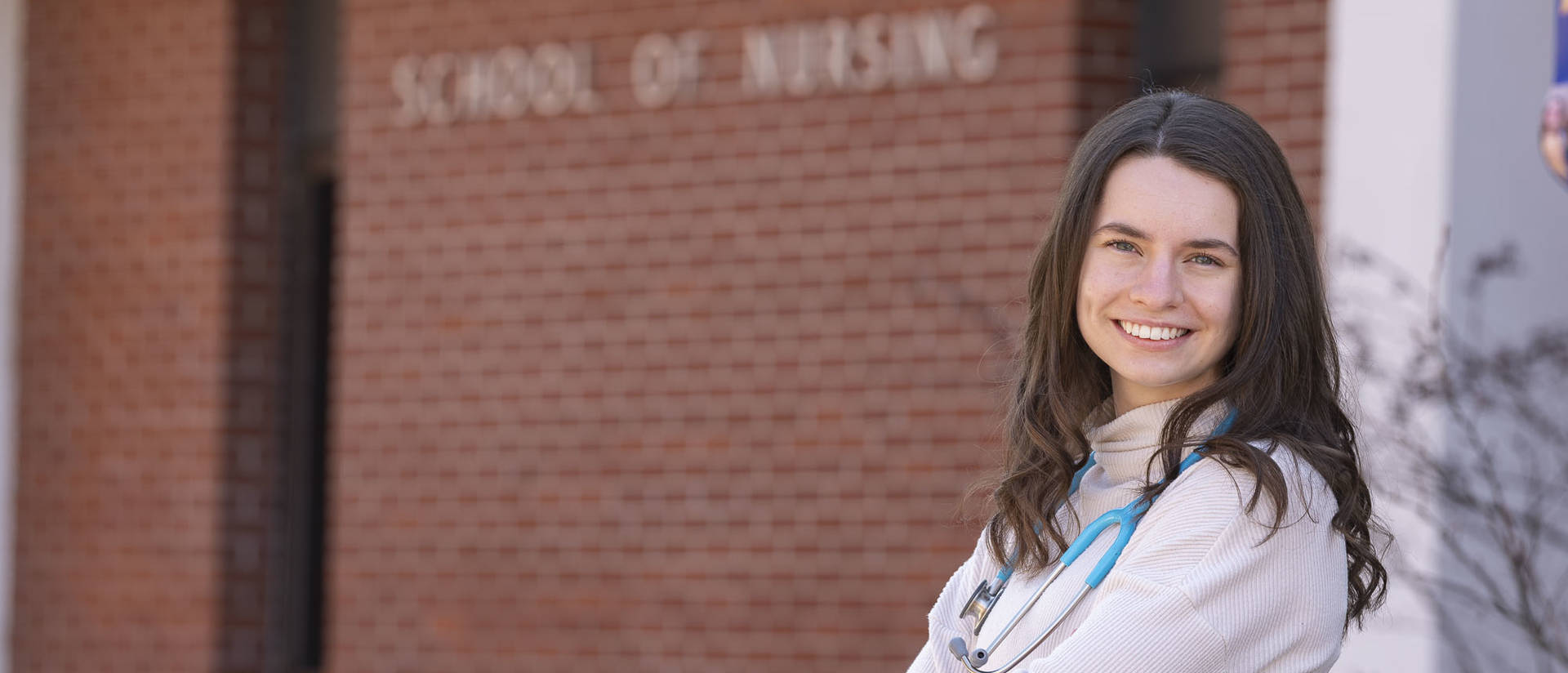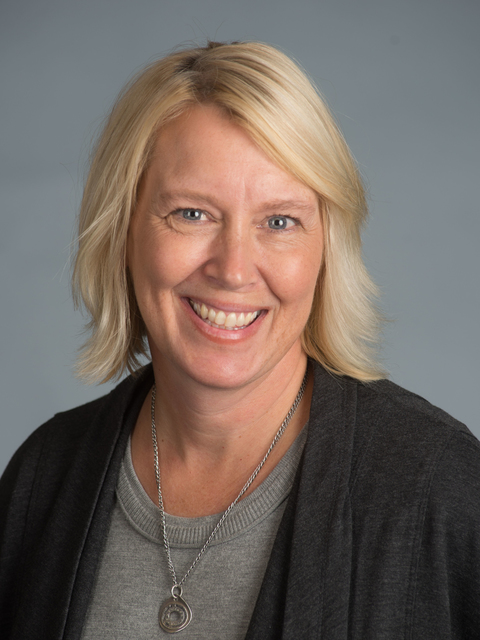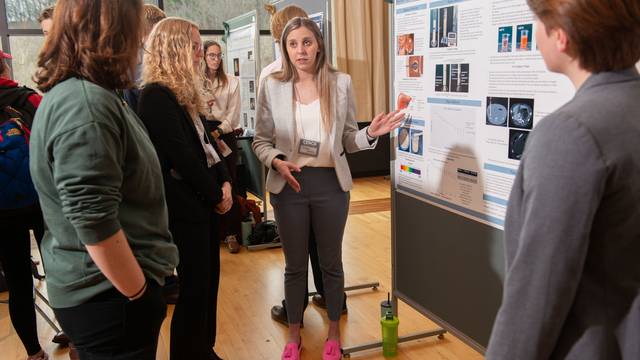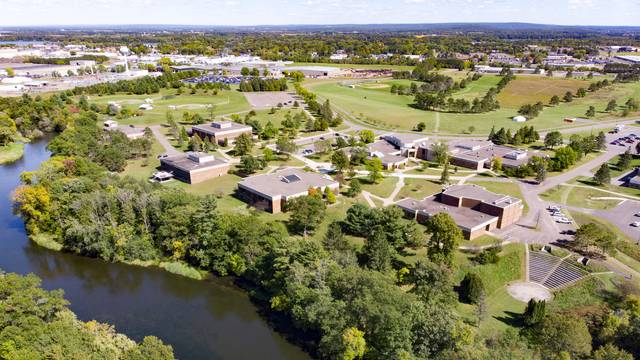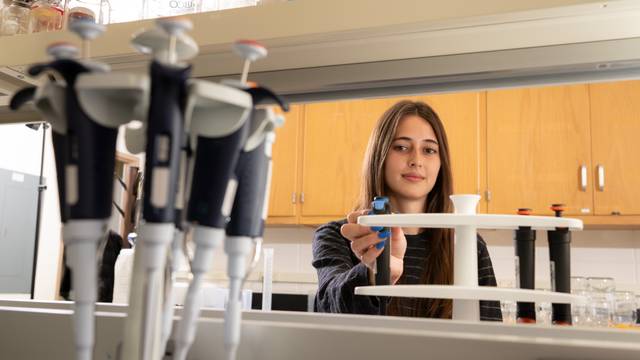Photo caption: Brooke Anderson plans to use the many skills and experiences she gained through her UW-Eau Claire coursework and real-world experiences to launch a career in nursing after she graduates in May. Eventually, she plans to continue her education to pursue other opportunities within the health care field. (Photo by Bill Hoepner)
Brooke Anderson didn’t have to go far to see what a nursing degree from the University of Wisconsin-Eau Claire could do for her. After all, growing up she saw her mom — Cassie Anderson, a UW-Eau Claire nursing graduate — enjoy a successful career in health care thanks to her degree.
Anderson, who will graduate this month with a nursing major and a public health minor, now is eager to use the knowledge and experiences she gained as a Blugold to forge her own path within health care.
The Hudson native will begin her career as a nurse but hopes eventually to continue her education so she can pursue other opportunities within health care. She says nursing will be an exceptional foundation for a variety of potential future careers, such as becoming a nurse practitioner, physician assistant, researcher, public health official or educator.
“I don’t know exactly where I will end up, but the great thing about nursing is that there are many different career paths that I can take,” Anderson says of her future.
Discovering public health
Anderson always has had a passion for science and an interest in health care, so when she discovered UW-Eau Claire’s public health program, she knew it would be the perfect complement to her nursing studies.
At the time, she had no idea that a year after declaring it as her minor, public health would take center stage as the COVID-19 pandemic upended the world. Topics she was studying in public health courses, such as vector-borne diseases and epidemiology, were relevant to what was happening in real time, making her classes even more meaningful.
“I’m so glad I decided to do the public health minor because the courses I’ve taken have given me a new perspective of what health is and why the health of various populations is so important,” Anderson says. “It also opened my eyes to many career opportunities and allowed me to experience things that will make me a more well-rounded nurse.”
During the pandemic, she volunteered with the Eau Claire City-County Health department, providing COVID-19 testing to people who did not have health insurance or did not have access to other testing. She also volunteered at the COVID-19 vaccine clinics on campus, administering vaccines to members of the Eau Claire and campus communities.
As a public health minor, Anderson participated in the Area Health Education Center (AHEC) program, which helped her learn more about vulnerable populations in Eau Claire County. She also designed posters for the Eau Claire City-County Health Department that aimed to help decrease tick bites and the incidence of Lyme disease.
“Having a minor in public health has helped me see the importance of health education not only on an individual level, but also for entire communities,” Anderson says. “I would definitely consider working in a public health position at some point in my career because I find it so interesting and so important.”
Real-world research
Since her sophomore year, Anderson has been part of a research project that focuses on how to improve care for children with multiple chronic health conditions, another real-world experience that is helping to shape how she sees her future.
“These children have complex medical needs, which can be challenging for the patients and families to handle, so they need extra support from health care systems,” Anderson says of her research.
The research involves making follow-up phone calls to patients and their families after the patient is discharged from the hospital.
“We are looking at how the level of education of the caller (nurse versus provider), the topics discussed on the phone calls and other factors impact the outcomes of these patients,” Anderson says. “Some of the outcomes we are looking at are the number of calls made to the clinic, how many clinic visits the patient has and how many readmissions there are after the patient is discharged.”
The project has been an extraordinary learning experience, especially regarding the care of complex patients and the process of doing research, Anderson says.
“This project helped me discover my passion for research and the need for continuous improvement within health care,” Anderson says.
Her research mentors are Dr. Amanda Seeley, who was an assistant professor of nursing at UW-Eau Claire when Anderson joined the project and a pediatric nurse practitioner at Gillette Children’s Specialty Healthcare in St. Paul, Minnesota, and Dr. Rhonda Cady, a clinical scientist at Gillette.
“Dr. Seeley is a wonderful mentor and professor; I’ve been lucky to work with her for the past couple years,” Anderson says. “Her confidence in me has made me more confident in myself and my ability to work as a nurse or any other career path that I may end up in.”
All the faculty and staff she’s met through her UW-Eau Claire nursing studies have been “supportive and understanding,” Anderson says. “I believe they really want each individual student to succeed, so they put in extra effort to make sure that we do.”
Life-changing immersion
In addition to research, Anderson also was part of a clinical program that takes nursing students to the Rosebud Reservation in South Dakota, home to the Rosebud Sioux Tribe. Her experiences there also will help her in her future career.
During the immersion, Anderson spent time with community members in a variety of settings, such as in the hospital, clinic, dialysis center, church and schools. She also joined community members in many community events.
The community events were the best part of the experience because it allowed her to interact with and learn from community members, Anderson says. A highlight of their time on the reservation was attending the Veterans Day Powwow, where students were invited to dance with community members and observe a naming ceremony. Being part of the event was “an honor,” Anderson says.
Her experiences on the Rosebud Reservation will influence how she goes about her work as a nurse, Anderson says. The immersion opened her eyes to “the health and educational disparities that are present on the reservation,” she says. “Because of the lack of jobs, many people are unemployed and struggle to afford transportation, health services, food and other necessities.”
Others she talked with don’t trust the medical system or aren’t aware of the health care services available to them, Anderson says. Still others shared the challenges they face as they try to pursue an education. For example, a staff member at the dialysis center shared that his dream is to become a registered nurse, but with no nursing schools close by, he would have to move away from his family to complete his education.
“Even with these issues present, it was amazing to see how tight-knit and supportive the community was,” Anderson says.
Given her experiences on the reservation, Anderson says when working as a nurse she’s even more determined to be intentional about integrating cultural and religious practices into health care.
“It is important to be respectful of cultural preferences that will make each patient and family more comfortable during stressful situations,” Anderson says. “I hope that in my career, I am able to look at each patient holistically to provide the best possible care.”
Embracing opportunities, connections
Anderson also found plenty of other mentors and opportunities on and off campus during her four years at UW-Eau Claire.
For example, Dr. Sarah Conlin, who was the clinical instructor for Anderson’s pediatric clinical at Gillette Children's Specialty Healthcare, “was an amazing instructor who was knowledgeable and enthusiastic about providing quality care to the pediatric population,” Anderson says. “She gave us the opportunity to be independent, while also providing support when needed. She helped improve my confidence with completing various nursing skills and helped me discover my passion to care for pediatric patients.”
Describing her student as a “gem,” Conlin says Anderson is an “exemplar” nursing student who will do well in the health care field.
“Brooke seeks rationale to her nursing interventions and shows compassion in her care,” Conlin says. “She listens first and asks questions if needed, which is an important attribute while learning the art and science of the nursing profession.”
As a Blugold, Anderson says she also found opportunities to build her interpersonal skills, which also will be valuable when working as a nurse. She held leadership positions in the Researchers and Innovators Club and worked as a teaching assistant for an anatomy and physiology class.
In addition, she is a certified nursing assistant at Mayo Clinic Health System, which, she says, “has been a great way to prepare myself for working as a registered nurse after graduation.”
After earning her degree this spring, Anderson hopes to work as a pediatric registered nurse in the Twin Cities area.
“Working on my research project and having clinical experience at Gillette Children’s Specialty Healthcare helped me discover my passion for working with younger populations, so that is something I am going to pursue,” Anderson says. “In the future, I plan to go back to school to become a health care provider or to pursue a career in research.”
